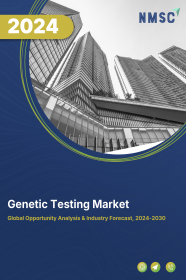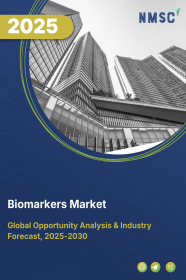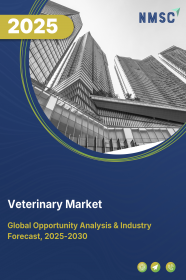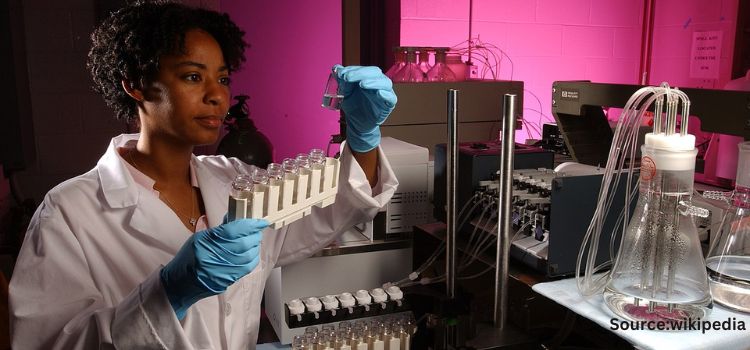
Genetic Testing Market by Type (Predictive and Pre-symptomatic Testing, Carrier Testing, Prenatal and Newborn Testing, Diagnostic Testing, Pharmacogenomic Testing, and Others), by Technology (Cytogenetic Testing, Biochemical Testing, and Molecular Testing), by Application (Cancer diagnosis, Genetic Disease Diagnosis, Cardiovascular Disease Diagnosis, and Others) – Global Opportunity Analysis and Industry Forecast 2024-2030
US Tariff Impact on Genetic Testing Market
Trump Tariffs Are Reshaping Global Business
Market Definition
The Genetic Testing Market size was valued at USD 18.31 billion in 2023 and is predicted to reach USD 34.14 billion by 2030 with a CAGR of 9.3% from 2024-2030. Genetic testing is a medical diagnostic procedure that involves analyzing an individual's DNA to identify variations, mutations, or alterations in specific genes or chromosomes. This examination provides insights into an individual's genetic makeup, including their risk of developing certain diseases or conditions, potential response to medications, ancestry, and familial relationships. Through genetic testing, healthcare providers and individuals can make informed decisions about disease prevention, treatment options, and family planning.
Market Dynamics and Trends
The global genetic testing market is experiencing substantial growth driven by the rising prevalence of genetic diseases such as down syndrome, congenital disorders, breast cancer, and hemophilia. Genetic testing plays a pivotal role in the early detection of diseases, enabling targeted medical interventions and personalized treatments. According to data provided by the World Health Organization in February 2023, congenital disorders alone are responsible for approximately 240,000 deaths of newborns within 28 days of birth annually, with an additional 170,000 deaths of children aged between 1 month and 5 years. These statistics underline the critical importance of genetic testing in addressing global health challenges and driving the growth of the genetic testing market.
Also, the increasing popularity of personalized genetic testing services is driving the growth of the genetic testing market. These services offer personalized insights into individuals' genetic predispositions, disease risks, and potential responses to specific treatments, fostering a more tailored approach to healthcare. By facilitating swift disease prevention, personalized genetic testing empowers individuals to make informed decisions about their health and well-being. For Instance, in July 2023, Quest Diagnostics introduced Genetic Insights, a genetic test that analyzes 36 genes using a saliva specimen. This test provides valuable information on potential risks of inheritable conditions such as breast and colon cancer, heart and blood disorders, among others. Such advancements in genetic testing technology showcase the market's growth trajectory and its pivotal role in shaping personalized healthcare on a global scale.
However, the high expenses linked with genetic testing procedures restrains the genetic testing market. This cost volatility restricts access to testing, particularly in low-income countries, thereby limiting its adoption.
On the contrary, advancements in Non-invasive prenatal testing (NIPT) are expected to create opportunities in the genetic testing market in coming years. This type of testing are expected to allow doctors to screen for genetic abnormalities in a fetus without the need for an amniocentesis or chorionic villus sampling (CVS), which are invasive procedures.
Market Segmentation and Scope of Study
The genetic testing market is divided on the basis of type, technology, application and region. On the basis of type, the market is categorized into predictive & pre-symptomatic Testing, carrier testing, prenatal & newborn testing, diagnostic testing, pharmacogenomic testing, and others. On the basis of technology, the market is divided into cytogenetic testing, biochemical testing, and molecular testing. And on the basis of application, the market is bifurcated into cancer diagnosis, genetic disease diagnosis, cardiovascular disease diagnosis, and others. Regional breakdown and analysis of each of the aforesaid segments includes regions such as, North America, Europe, Asia-Pacific, and Rest of the World (RoW).
Geographical Analysis
North America holds the dominating share of genetic testing market and is expected to continue its dominance during the forecast period. This is attributed to the emergence of low-cost genetic screening facility in the region. Low-cost genetic screening makes testing affordable for people with low-income, especially in underserved areas, further driving market expansion. For instance, in March 2022, City of Hope, a California-based cancer centre, launched an initiative in Mexico, offering low-cost genetic screening and addresses limited access to genetic testing in Mexico due to high costs and lack of specialized clinicians. The program established an oncogenetics department, to improve patient care and genetic registry. It also facilitates the U.S. cancer genetics professionals in referring high-risk patients' relatives in Mexico for valuable screenings, creating a mutually beneficial system.
Also, in North America, the genetic testing market is experiencing significant growth, largely driven by the presence of key industry leaders such as Abbott Laboratories, illumina Inc. and Quest Diagnostics Incorporated. These major players are playing a pivotal role in driving market expansion by fostering healthy competition, promoting innovation, and introducing a diverse range of products aimed at enhancing access to genetic testing services. For instance, in March 2022, Illumina launched a multi-gene test specifically designed to identify rare and treatable cancers. This test identifies genetic mutations associated with various types of cancer, such as lung, ovarian, and pancreatic cancer.
On the other hand, Asia-Pacific region is expected to show a steady rise in the genetic testing market due to the high demand for genetic tests aimed at identifying cancer risks and tailoring treatments. This growth is fueled by rising awareness and improved healthcare infrastructure, all of which create promising prospects for genetic testing companies in the region. For instance, in July 2023, The University of New South Wales (UNSW) launched PrOSPeCT, a cancer genomics program, aiming to accelerate cancer treatment through genetic testing, targeted therapies, and enhanced clinical trial enrolments. This initiative aims to provide genetic testing to over 23,000 individuals with incurable cancers, improving access to advanced treatments.
Moreover, collaborations among companies in the Asia-Pacific region to develop genetic testing technologies is boosting the genetic testing market. These companies are adopting advanced lab techniques and DNA sequencing method for quick diagnosis of diseases, attracting more patients and increasing the demand for genetic testing. For instance, in September 2022, SOPHiA GENETICS, a healthcare tech company, partnered with SOFIVA GENOMICS in Taiwan for its HRD genetic testing service. This collaboration allows SOFIVA to maintain data ownership and SOPHiA GENETICS' platform to analyses complex data, facilitating its expansion in Asia-Pacific, including recent adoptions in India and Israel.
Competitive Landscape
Various market players operating in the genetic testing market are Abbott Laboratories, QIAGEN N.V, Bio-Rad Laboratories, Inc., Eurofins Scientific SE, Quest Diagnostics Incorporated, 23andMe Holding Co, Associated Regional and University Pathologists, Inc., DNA Worldwide, MYDNA, Inc., and Illumina, Inc. These market players are opting various strategies such as product launches and collaboration to maintain their dominance in the global bamboo market.
For Instance, in June 2023, Associated Regional and University Pathologists, Inc. introduced the AAV5 DetectCDx, which gained FDA approval as companion diagnostic immunoassay designed for a gene therapy product. It was developed in collaboration with BioMarin and is meant to assist in selecting patients eligible for specific treatments.
Moreover, in January 2023, QIAGEN Digital Insights. launched an ultra-fast next-generation sequencing (NGS) analysis that can process a whole genome within 25 minutes in minimal cost. The enhanced system can analyse and interpret whole genome sequencing (WGS), whole exome sequencing (WES), and large panel sequencing data in very fast speed, and is a cost-efficient option.
Furthermore, in January 2023, 23andMe collaborated with Sickle Cell 101, to spread Sickle Cell Carrier Status Awareness Program. The program offers DNA testing and access to 23andMe's Health + Ancestry Service to participants The company is dedicated to increasing awareness about sickle cell conditions and other health issues affecting communities, particularly the Black and African American populations to spread wide adoption of genetic testing.
KEY BENEFITS
-
The report provides quantitative analysis and estimations of the genetic testing market from 2024 to 2030, which assists in identifying the prevailing market opportunities.
-
The study comprises a deep-dive analysis of the genetic testing market including the current and future trends to depict prevalent investment pockets in the market.
-
Information related to key drivers, restraints, and opportunities and their impact on the genetic testing market is provided in the report.
-
Competitive analysis of the players, along with their market share is provided in the report.
-
SWOT analysis and Porters Five Forces model is elaborated in the study.
-
Value chain analysis in the market study provides a clear picture of roles of stakeholders.
KEY MARKET SEGMENTS
By Type
-
Predictive & Pre-symptomatic Testing
-
Carrier Testing
-
Prenatal and Newborn Testing
-
Diagnostic Testing
-
Pharmacogenomic Testing
-
Others
By Technology
-
Cytogenetic Testing
-
Biochemical Testing
-
Molecular Testing
By Application
-
Cancer diagnosis
-
Genetic Disease Diagnosis
-
Cardiovascular Disease Diagnosis
-
Others
By Region
-
North America
-
The U.S.
-
Canada
-
Mexico
-
-
Europe
-
The UK
-
Germany
-
France
-
Italy
-
Spain
-
Denmark
-
Netherlands
-
Finland
-
Sweden
-
Norway
-
Russia
-
Rest of Europe
-
-
Asia-Pacific
-
China
-
Japan
-
India
-
South Korea
-
Australia
-
Indonesia
-
Singapore
-
Taiwan
-
Thailand
-
Rest of Asia-Pacific
-
-
Rest of the World (RoW)
-
Latin America
-
Middle East
-
Africa
-
REPORT SCOPE AND SEGMENTATION:
|
Parameters |
Details |
|
Market Size in 2023 |
USD 18.31 billion |
|
Revenue Forecast in 2030 |
USD 34.14 billion |
|
Growth Rate |
CAGR of 9.3% from 2024 to 2030 |
|
Analysis Period |
2023–2030 |
|
Base Year Considered |
2023 |
|
Forecast Period |
2024–2030 |
|
Market Size Estimation |
billion (USD) |
|
Growth Factors |
|
|
Countries Covered |
28 |
|
Companies Profiled |
10 |
|
Market Share |
Available for 10 companies |
|
Customization Scope |
Free customization (equivalent to up to 80 working hours of analysts) after purchase. Addition or alteration to country, regional, and segment scope. |
|
Pricing and Purchase Options |
Avail customized purchase options to meet your exact research needs. |
KEY PLAYERS
-
Abbott Laboratories
-
QIAGEN N.V.
-
Bio-Rad Laboratories, Inc.
-
Eurofins Scientific SE
-
Quest Diagnostics Incorporated
-
23andMe Holding Co.
-
Associated Regional and University Pathologists, Inc.
-
DNA Worldwide
-
MYDNA, Inc.
-
Illumina, Inc.

















 Speak to Our Analyst
Speak to Our Analyst




















